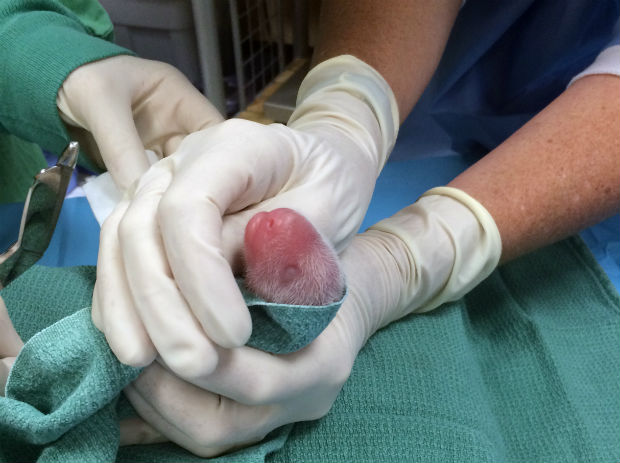Surprise! US panda gives birth to twins

In this photo provided by the Smithsonian’s National Zoo, one of the giant panda cubs is examined by veterinarians after being born at Smithsonian’s National Zoo on Saturday, Aug. 22, 2015, in Washington. The National Zoo in Washington says its adult female panda has had twins. Becky Malinsky/Smithsonian’s National Zoo via AP
WASHINGTON, United States — A rare giant panda called Mei Xiang gave birth to twin cubs at the Smithsonian National Zoo in Washington on Saturday, apparently surprising delighted zoo officials who had expected just one baby.
A first tiny cub — pink, hairless and only about the size of an adult mouse — was born at 5:35 pm (2135 GMT) and Mei Xiang reacted by tenderly picking up the cub.
Immediately after the zoo announced the birth, the live video feed from her straw-lined enclosure appeared to have crashed, likely due to a high volume of viewers, the zoo said.
“All of us are thrilled that Mei Xiang has given birth. The cub is vulnerable at this tiny size but we know Mei is an excellent mother,” zoo director Dennis Kelly said.
Pandas are famously challenging to breed in captivity, but just when conservationists thought they had heard all the good news, the zoo tweeted just a few hours later: “We can confirm a second cub was born at 10:07. It appears healthy. #PandaStory.”
Article continues after this advertisementThe birth of the twins appeared to be a surprise, as the zoo’s Twitter feed had only previously referred to the expected birth of a single cub.
Article continues after this advertisementThe mother panda’s care team had begun preparing after they saw Mei Xiang’s water break about an hour before the first birth. They hope to carry out neonatal exams in the coming days and won’t know the cubs’ sex until a later date.
Paternity tests
Mei Xiang was artificially inseminated in April with frozen semen from a male giant panda named Hui Hui that resides at the China Conservation and Research Center for the Giant Panda in Sichuan province.
She was also inseminated with fresh semen from the zoo’s male giant panda Tian Tian. DNA tests will establish which is the father.
Mei Xiang had a cub in 2005 which was sent to China, and another, Bao Bao is now two years old and lives with her in Washington.
But she also lost at least two other cubs, one that was stillborn in 2013 and another that lived just six days in 2012.
This year, Mei Xiang exhibited signs of pregnancy in July that included sleeping more, eating less, building a nest and spending more time in her den.

Giant Panda Mei Xiang, mother of panda youngster Bao Bao who was born August 23, 2013, sleeps in the indoor habitat at the Smithsonian’s National Zoo in Washington, Wednesday, August 12, 2015. AP FILE PHOTO
The zoo said Mei Xiang will spend almost all her time in her den for the next two weeks. The enclosure will be closed to provide quiet, though online “panda cams” provide a video stream of the creatures.
On Tuesday, Malaysia announced that a giant panda at its National Zoo, Liang Liang, had given birth. The newborn’s sex has yet to be determined.
There are fewer than 2,000 pandas now left in the wild, according to the World Wildlife Fund, as their habitats have been ravaged by development.
Roads and railways cut through the bamboo forests they depend upon in China’s Yangtze Basin, their primary habitat.
Pandas rely on bamboo and eat almost nothing else. Given their low birthrate, captive breeding programs are key to ensuring their survival.